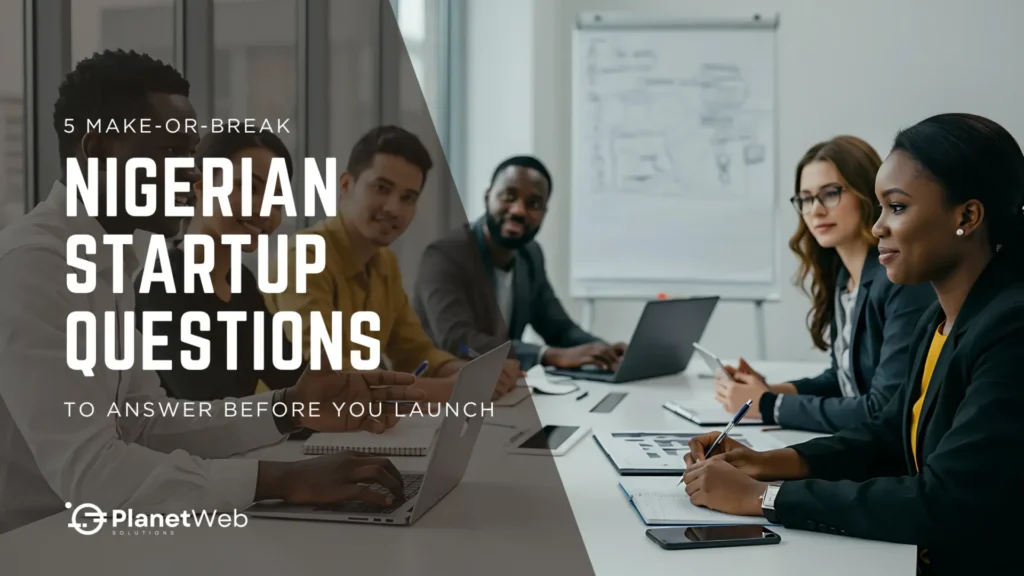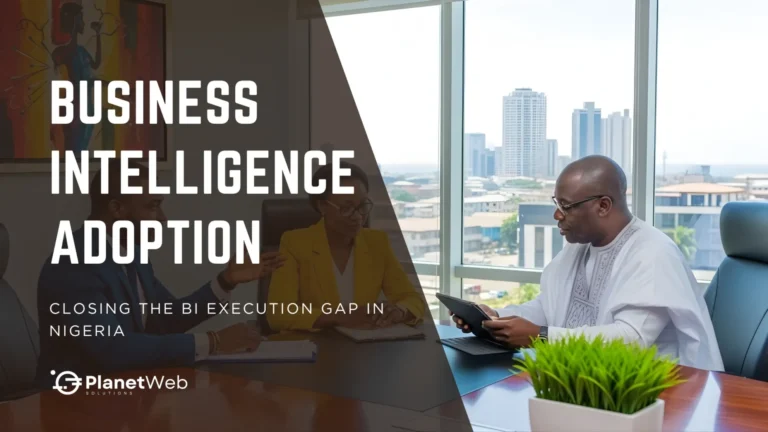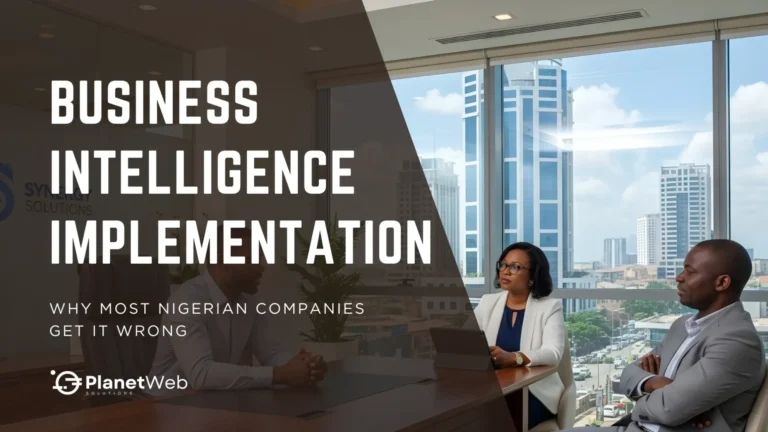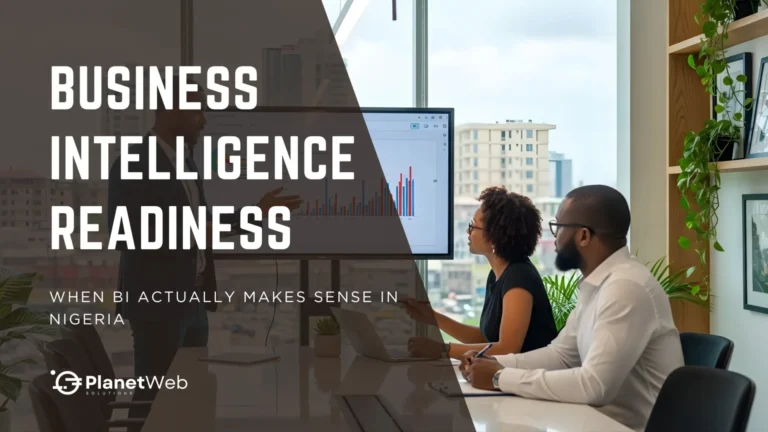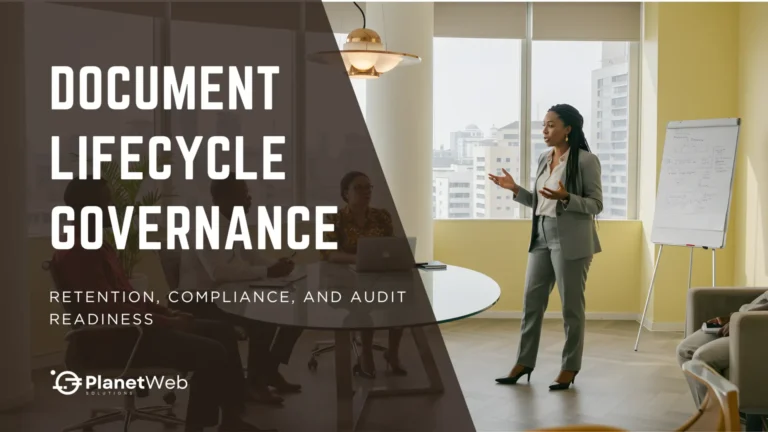Nigerian Startup Questions: The Validation Gap Most Founders Skip
Between 2024 and 2025, dozens of Nigerian startups that raised over $50 million collectively shut down or pivoted. Thepeer, BuyCoins Pro, HerRyde—different sectors, different models, same outcome.
The pattern? They all launched with assumptions they never validated. They built products users didn’t want, in markets that weren’t ready, with teams that couldn’t execute.
These weren’t random failures. They were predictable outcomes—startups that launched without answering fundamental questions about their market, model, and readiness. Most founders obsess over pitch decks, MVP features, and fundraising strategy. But they skip the hard questions that actually determine survival.
We call this the Validation Gap—the distance between what founders assume and what they’ve actually proven.
This article breaks down 5 make-or-break Nigerian startup questions that separate survivors from shutdowns. These aren’t theoretical exercises. They’re filters that force you to confront assumptions before the market does it for you. Answer these honestly, and you’ll either build something resilient or realize you need to pivot before burning capital.
If you want to know what mistakes to avoid while building, read our companion pieces: 7 Startup Mistakes in Nigeria, Startup Models to Avoid in Nigeria, and 7 Patterns Behind What’s Actually Working.
Question 1: Are You Solving a Real Problem or Chasing FOMO?
Why founders skip this: Building what’s trending feels safer than building what’s needed. If fintech is hot, founders build fintech. If AI is getting funded, they bolt AI onto everything. It looks like pattern-matching for success, but it’s actually pattern-matching for failure.
The brutal truth: Founders who lead with trends rather than problems burn out fast. They’re not building for users—they’re building for headlines, investors, or their own resume. When the trend shifts or funding dries up, there’s no real product-market fit holding the business together.
ThriveAgric succeeded because they weren’t “digitizing farming”—they were solving systemic gaps in food production and farmer financing. They understood the problem deeply before building the solution. Contrast that with Thepeer, which shut down in 2024 despite early hype around wallet-to-wallet transfers. The problem they were solving wasn’t urgent enough for Nigerian users to overcome trust barriers and adoption friction.
How to answer this honestly:
Track organic interest without incentives. Create a WhatsApp waitlist, post about the problem (not your solution) on X or LinkedIn, or share it in relevant communities like Nairaland. Are people signing up without discounts or giveaways? If you need to pay people to care, the problem might not be painful enough.
Measure problem intensity, not just existence. Everyone has problems. Not every problem is worth solving. Ask: Would someone pay to solve this today? Would they change their behavior? Would they abandon an existing solution? If the answer is no, you’re solving a “nice-to-have” problem in a “must-have” economy.
Test if you’re still excited when the hype dies. The real test: Are you working on this six months from now when no one’s tweeting about it, investors aren’t calling, and your friends have stopped asking how it’s going? If the answer is no, you’re chasing validation, not solving problems.
When FOMO might be okay: If you’re genuinely early to a trend with deep expertise (not just reading TechCrunch), have capital to outlast the hype cycle, and understand that 90% of trend-chasers will fail before you succeed.
Question 2: Is Nigeria Ready for This Right Now?
Why founders skip this: Founders confuse “eventually” with “now.” They see a gap in the market and assume the market is ready to fill it. They ignore that Nigeria’s readiness for any innovation depends on infrastructure, regulation, trust levels, and spending priorities—all of which change slowly.
The brutal truth: Timing in Nigeria is brutal. Regulatory whiplash kills startups overnight. The CBN crypto ban in 2021 forced platforms to completely restructure. The 2023 naira redesign caught cash-dependent startups off guard. The NDPA enforcement in 2024 added compliance costs many early-stage startups couldn’t afford.
Even good ideas launched at the wrong time die. Open banking infrastructure like Okra raised $16.5 million but shut down because market adoption took longer than their runway allowed. They were right about the eventual need—wrong about “now.”
How to answer this honestly:
Check regulatory alignment. Does your business align with current policy trends (Nigeria Startup Act, NITDA frameworks, CBN fintech regulations)? Or are you building against regulatory headwinds? If you’re betting on policy changing in your favor, you’re gambling with runway.
Stress-test against economic volatility. Can your model survive if Naira hits ₦2,000 to $1? If inflation exceeds 35%? If fuel prices double? Nigerian founders must build for economic chaos, not stability. If your margins only work in stable conditions, you’re exposed.
Measure actual infrastructure vs assumed infrastructure. Your model might assume reliable internet, but 30% of Nigeria still lacks consistent connectivity. It might assume addressing systems, but most areas don’t have street names. It might assume digital payments, but 65% of transactions are still cash. Design for the infrastructure that exists, not what you wish existed.
Assess genuine demand vs aspirational demand. People might say they want your product in surveys, but do they have the budget for it right now? In a survival-first economy, discretionary spending collapses fast. If you’re not solving a survival-level problem, timing matters even more.
When timing uncertainty is acceptable: If you’re building infrastructure (tools that other startups need), the timing question matters less because you’re enabling the ecosystem rather than depending on end-user readiness.
Question 3: What’s Your Unfair Advantage, and Can It Survive Lagos Stress?
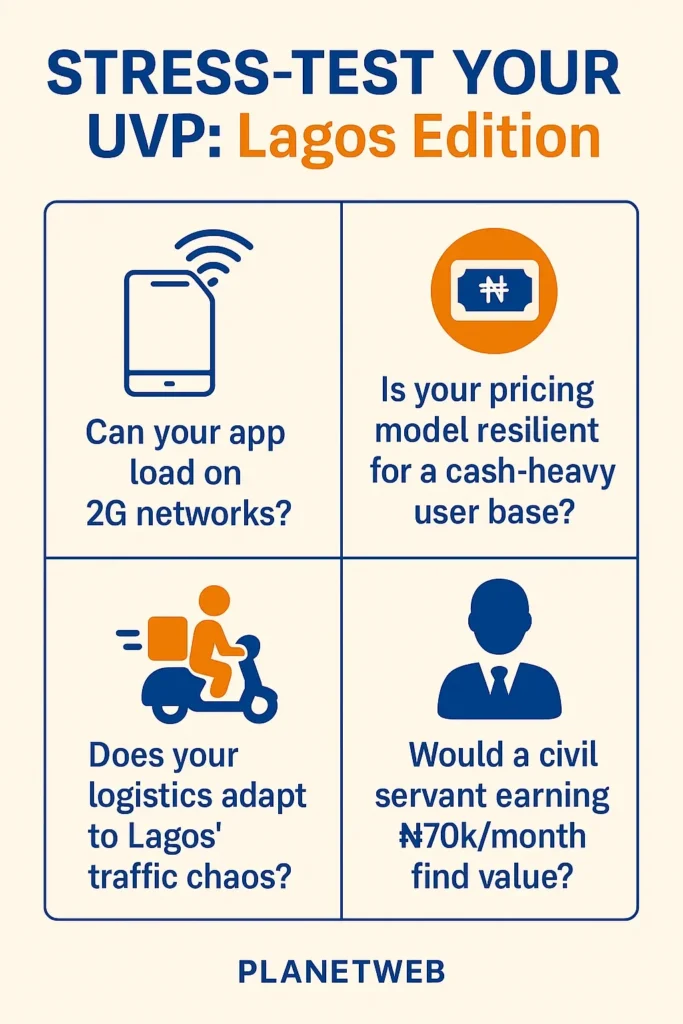
Why founders skip this: Most founders confuse features with advantages. They think a beautiful UI or faster checkout is a defensible strategy. It’s not. Anything you can build, competitors can copy in 3-6 months. Real unfair advantages are structural—things competitors can’t easily replicate.
The brutal truth: Differentiation matters, but durability matters more. You might have the best UX in fintech, but if your app requires consistent internet and your competitors work offline, you lose in Aba, Onitsha, and most of Nigeria beyond Lagos. Chowdeck survives because they adapted to Lagos traffic chaos, not despite it. They own logistics infrastructure, which is expensive and hard to replicate.
How to answer this honestly:
Identify what’s actually unfair. Unfair advantages in Nigeria include: exclusive distribution networks (Moniepoint’s agent banking), proprietary data (credit scoring algorithms), regulatory licenses (takes 12+ months), deep local relationships (supplier networks like TradeDepot), or owned infrastructure (Moove’s vehicle fleet). Features aren’t advantages. Structural assets are.
Stress-test against Nigerian realities. Does your product work over 2G connections? Can it run offline or in low-data zones? Can your pricing work for someone earning ₦70,000 monthly? Are you designed for cash-heavy markets? If your advantage evaporates under Nigerian constraints, it’s not really an advantage.
Map your UVP against common failure points:
- Poor power and internet infrastructure
- High user churn due to UX friction on cheap Android phones
- Broken last-mile logistics (traffic, no addressing)
- Low trust in digital platforms and prepayment
- Price sensitivity and survival-first spending
If your UVP doesn’t address or work around these, competitors who do will win.
Test defensibility. If a well-funded competitor launched tomorrow with the same features, what would keep your users from switching? If the answer is “nothing,” you don’t have an unfair advantage—you have a temporary head start.
When you can launch without a clear advantage: If you’re building to learn, validate a market, or establish a beachhead before competitors notice. But understand you’re racing to build real advantages before funding runs out.
Question 4: Does Your Team Actually Understand Operating in Nigeria?
Why founders skip this: Founders hire for credentials and skills, but ignore operational context. They bring in talent from Silicon Valley playbooks without local execution experience. They assume smart people can figure out Nigeria on the job. They can’t—not fast enough.
The brutal truth: Ideas matter, but investors bet on execution. Especially in Nigeria, where operating conditions are unpredictable, investors want founders who can navigate chaos, not just pitch through it. A developer who built in San Francisco doesn’t know how to optimize for 2G connections or design for low-end Android devices. A growth lead from London doesn’t understand Lagos okada drivers or Aba traders.
A fintech that raised $1 million lost 60% of its clients when its foreign-trained CEO couldn’t navigate Nigerian compliance requirements and made decisions that violated CBN regulations. Another startup folded because no one on the team understood informal retail distribution—they tried to use Silicon Valley B2B playbooks in Onitsha market.
How to answer this honestly:
Audit for operational context, not just credentials. Your team needs:
- Someone with real Nigerian operations experience (not just visits, actual day-to-day execution)
- A product lead who has launched in volatile, low-infrastructure environments
- A regulatory advisor (through Lagos Chamber of Commerce, DIYLaw, or LawPavilion)
- A growth lead who understands local user behavior, not just international best practices
- Engineering talent that knows how to build for offline-first, low-bandwidth, cheap devices
Check for complementary strengths. Do you have someone who understands Abuja’s public sector dynamics and someone who knows Aba’s informal trade networks? Do you have tech talent and street-smart operators? The best teams blend international expertise with deep local knowledge.
Assess resilience over pedigree. Have your team members built through adversity? Launched during economic crises? Navigated regulatory uncertainty? Pedigree from top schools matters less than evidence of execution under Nigerian constraints.
Fill gaps before they kill you. If you don’t have regulatory expertise, get an advisor before you launch. If you don’t understand logistics, partner with someone who does. If you don’t know your target user’s daily life, embed yourself in their world for weeks, not days.
When you can skip this: If you’re pre-product and pre-funding, you can learn as you go. But by the time you’re raising or launching, team gaps become execution gaps that kill startups.
Question 5: Can You Prove Traction, or Are You Just Loud?
Why founders skip this: Founders confuse visibility with validation. They think Twitter engagement, press mentions, or demo day applause equals traction. It doesn’t. Real traction is users paying, returning, and referring—not liking your posts.
The brutal truth: Nigerian investors want proof, not potential. VCs like Ventures Platform, ARM Labs, and Future Africa have been burned by startups with great decks but no real users. They’ve shifted to prioritizing early validation, localized insights, and evidence of product-market fit.
Mass emailing pitch decks won’t cut it. Talking about “the African market” (200 million people!) won’t cut it. Investors want specifics: Who exactly are your users? Where are they? What problem are you solving for them? How much are they paying? How often do they come back?
How to answer this honestly:
Show traction, not theory. Real proof points investors respect:
- Waitlists from WhatsApp or Telegram communities (organic, not paid)
- Beta test results segmented by region or user type
- Micro-pilot case studies (Surulere vs Ikoyi conversion rates, for example)
- Pre-orders or actual revenue from pilot cohorts
- Retention metrics (weekly active users, monthly repeat purchases)
- Referral rates (are users bringing others without incentives?)
Get specific about your market. Don’t pitch “Africa” or even “Nigeria.” Talk about Ikorodu riders, Maitama working professionals, or Aba traders. Investors want to know you understand a specific segment deeply, not that you’re chasing everyone.
Demonstrate understanding of unit economics. Even at a small scale, can you show the math works? What’s your CAC? Your ARPU? Your payback period? Your churn rate? If you can’t answer these with real data (not projections), you’re not ready to pitch.
Build relationships before you need capital. Attend ecosystem events, contribute to communities, and share learnings publicly. When you’re ready to raise, you want investors who already know your name and respect your work. Research VC theses using TechCabal’s Investor List, Crunchbase, or StartupList Africa. Mention portfolio overlaps to show you’re aligned, not just mass-pitching.
When you can pitch without traction: If you have an exceptional founder pedigree (previous successful exits), are solving a problem investors deeply understand from personal experience, or are building in a space where validation requires significant capital upfront (like hardware or biotech).
Understanding the Validation Gap
These five questions expose the Validation Gap—the distance between what you assume and what you’ve actually proven. Most Nigerian startup failures happen because founders close this gap too late, after burning through their runway.
The Validation Gap has three dimensions:
- Market validation: Do people actually want this, or do you just think they should?
- Model validation: Does the business model work in Nigerian realities, or only on paper?
- Team validation: Can your team execute this, or are they learning on your dime?
Successful founders close the validation gap before raising capital, not after. They answer these questions with evidence, not assumptions. They build proof, not just prototypes.
Final Thoughts: Validate First, Launch Better
Nigeria rewards prepared founders. The ecosystem is harder than Silicon Valley—unreliable infrastructure, regulatory uncertainty, survival-first spending, and limited patient capital. But that also means opportunities are wide open for founders who are intentional.
Key takeaways:
- Solve real problems, not trending problems
- Build for the Nigeria that exists, not the one you wish existed
- Unfair advantages must survive Nigerian constraints
- Teams need local operational context, not just credentials
- Proof beats potential every time
Answer these 5 make-or-break Nigerian startup questions early, and you’ll sharpen your vision, avoid wasted effort, and signal maturity to investors and co-founders.
Now that you know what questions to answer, learn what to build: 7 Patterns Behind What’s Actually Working in Nigeria. And understand what to avoid: 7 Startup Mistakes in Nigeria and Startup Models to Avoid in Nigeria.
Continue reading: Nigerian Startups Going Global: How Local Founders Are Scaling Internationally
Quick Validation Checklist
🚦 Before You Launch, Ask:
✅ Can I show organic demand (waitlists, beta signups) without paid incentives?
✅ Does the regulatory environment support this, or am I betting on policy changes?
✅ What’s my unfair advantage that competitors can’t easily copy?
✅ Does my team have actual Nigerian operating experience, not just credentials?
✅ Can I prove traction with real data (users, revenue, retention), not projections?
Frequently Asked Questions
Help Us Shape Smarter Startup Thinking
At PlanetWeb, we share practical ideas to help founders avoid wasted effort and build with the Nigerian market in mind.
✔ Share this with a founder who needs it
✔ Subscribe to our newsletter for more local startup content
✔ Follow us on LinkedIn or X for trends, tips, and case studies
Which question do you think trips up most Nigerian founders? Let us know in the comments.

